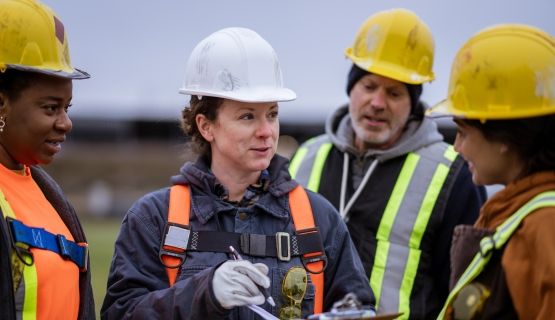Illness/injury prevention
IWH has a long history of conducting research to provide practical guidance to employers, workers, OHS professionals and regulators about what works and what doesn’t in injury or illness prevention. This research targets the injury and illness prevention practices of workplaces, as well as the programs developed by governments, health and safety associations and others to support and motivate workplaces to adopt effective practices.
Featured

At Work article
Differences in firm-level AI use for health and safety
To what extent are Canadian workplaces using artificial intelligence (AI) to help support workers’ health and safety? And what do these workplaces have in common? An IWH study surveyed firms across Ontario and British Columbia to find out.
Published: October 8, 2025

Impact case study
Saskatchewan’s construction safety group uses IWH tool to improve safety culture
This case study details how the Saskatchewan Construction Safety Association (SCSA) members have been analyzing IWH-OPM scores to adjust their safety practices and how SCSA has been using the data to tailor their outreach.
Published: February 10, 2025

At Work article
IWH study estimates costs of non-melanoma skin cancers due to sun exposure at work
IWH economist and senior scientist conducted the first estimate of the economic burden of non-melanoma skin cancers from work-related sun exposure in Canada.
Published: April 2018

At Work article
Embedding essential skills training in OHS lessons can boost learning: study
The work of rigging and hoisting loads comes with significant hazard. Adding to the injury prevention challenge is the fact that many people doing this work have literacy and numeracy skills gaps. A recent IWH study tried out a novel approach to address these learning needs.
Published: April 2018

At Work article
Violence prevention efforts face challenges despite commitment from hospital leaders
There has been a cultural shift in recent years when it comes to violence and aggression toward health-care workers. But despite commitment among hospital leadership to tackle the problems, prevention efforts still face several common challenges on the ground.
Published: April 2018

IWH in the media
Hidden costs of skin cancer caused by workplace sun exposure revealed
Skin cancer cases attributable to work-related sun exposure could be costing millions of dollars, and must be better addressed by policymakers, according to a study published in the Journal of Occupational and Environmental Hygiene.
Published: Science Daily, April 2018
Project
Project
Role of employers and settlement agencies in safe employment integration
Status: Completed 2020
Journal article
Journal article
Process evaluation of a participatory organizational change program to reduce musculoskeletal and slip, trip and fall injuries
Published: Applied Ergonomics, April 2018
Journal article
Journal article
The occupational health and safety vulnerability of recent immigrants accessing settlement services
Published: Canadian Journal of Public Health, April 2018

Tools and guides
Essential Skills and OHS Training
This guide, based on a research collaboration led by the Institute for Work & Health, provides an overview of the process involved in modifying the curriculum of an existing occupational health and safety (OHS) training program in order to address gaps in essential skills among worker trainees.
Published: April 2018
IWH Speaker Series
IWH Speaker Series
Towards a better understanding of differences in the risk of workplace violence for men and women in Canada
Workplace violence is getting increasing attention, especially within certain industries such as health care and education. This presentation will discuss results from two recently completed studies examining differences in the risk of workplace violence for men and women.
Published: March 2018

Impact case study
IWH research raises awareness of the economic burden of asbestos-related disease as Canada commits to ban
An IWH study estimating the lifetime cost of newly diagnosed cases of mesothelioma and lung cancer due to work-related asbestos exposures in a single year garnered much media and public interest, and was cited by Canadian government in its analysis of the impact of its regulation banning asbestos.
Published: March 2018